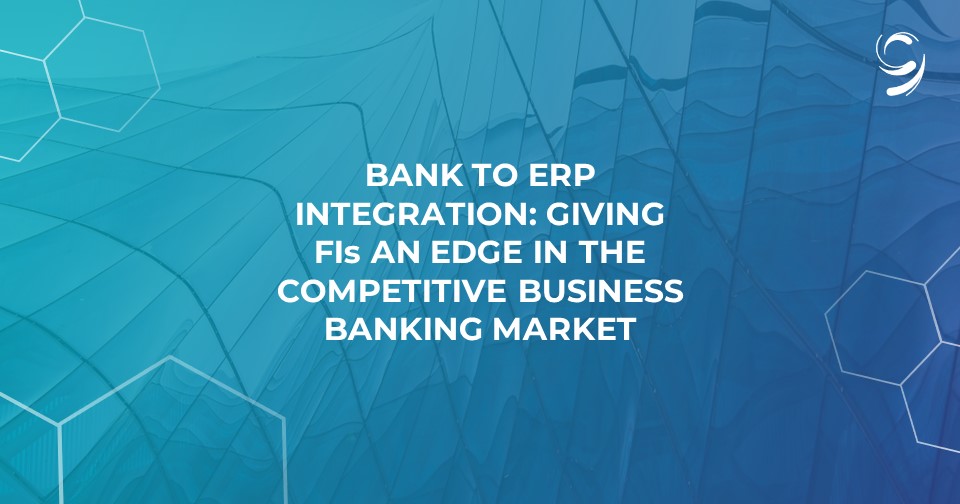While enterprise resource planning (ERP) is nothing new, businesses of all types and sizes continue to make significant investments in systems like NetSuite, Sage, and SAP. Allied Market Research anticipates CAGR of more than 10 percent in the ERP market over the next few years, to reach $78.40 billion by 2026.
Reliance on these applications also continues to grow. Banking ERP software is no longer just a means of collecting and storing data. They now play a crucial role in automating and streamlining critical workflows, and serve as a trusted source of insights that contribute to more precise business forecasting, and better strategic and tactical planning.
The Implications for FIs
Naturally, business banking customers want to maximize the value of their ERP investments. One of the most effective ways to accelerate ROI is to make sure the information contained within those systems is a complete, accurate, and timely reflection of all business activities.
That’s where direct integration of bank data to ERP systems comes in. To get a truly comprehensive picture of the state of the business, account and transaction information maintained by the organization’s financial institutions must be combined with the ERP’s record of operational activities. Accenture encourages businesses to “treat data as an asset” and “converge different data sources for deeper intelligence” in order to fully exploit the value of their ERPs.
FIs looking to differentiate themselves in the competitive business banking market can provide a seamless and secure way for business clients to embed banking data and services directly into their ERP systems, treasury management applications, and accounting tools. Instant access from these applications to banking data and payment functions empowers business customers to enhance mission-critical financial functions like cash and liquidity management as well as basic accounting tasks.
According to one Ninth Wave client, a well-known financial institutions, “I get at least one or two calls a week from our sales team competing in deals where the ability to integrate with prospects’ business applications is critical.”
Bank to ERP Integration is Complex
Gartner notes that integrating ERP systems with other data “has become an increasingly high stakes endeavor”. ERPs are just one of a growing number of applications FIs need to connect with. At the same time, they must balance network loads while ensuring security and data protection.
Smaller financial institutions often lack the internal resources to build such sophisticated integrations, while larger FIs would rather devote their resources to other, more high-profile technology initiatives.
FIs who recognize the tremendous benefits of sharing permissioned banking data with ERP systems, but are hesitant to tackle such a monumental project, can leverage an API platform, which serves as single, secure gatekeeper for all external data-sharing traffic. FIs can swiftly respond to customer demands for data sharing with ERP, accounting, and treasury management systems, without the devoting significant time and resources to building and maintaining the needed connections.
Real-World Success with NetSuite/Bank Connectivity
For one leading business bank, the use of cumbersome and unreliable file transfers to achieve bank to NetSuite connectivity was negatively impacting acquisition of new customers and retention of existing ones. Customers wanted a simpler, more efficient way to incorporate their banking information into mission-critical business processes and workflows. To meet these demands, the bank needed a frictionless, no-code way to share banking data with NetSuite.
A robust API platform provided the bank with native integration to NetSuite software which they now offer to their business clients. This secure, efficient integration allows the bank to deliver the enhanced experiences businesses expect today – providing accurate and actionable information they need to make informed and timely decisions.
About Ninth Wave
Ninth Wave delivers secure, seamless, and standardized data connectivity to fintechs and financial institutions of all sizes, through a single point of direct integration to a universal suite of open finance APIs. With configurable controls, visibility, and insights into all data sharing and data acquisition connections between aggregators, third-party apps, and internal applications, Ninth Wave empowers financial institutions and their customers with access and oversight to their connected apps, enabling secure data exchange in a holistic and scalable open finance ecosystem. Offering solutions for retail and commercial banks, wealth managers, credit card issuers, tax providers, and more, Ninth Wave provides unparalleled connectivity and universal compatibility to complex information systems, unlocking innovation, potential, and performance for your data. Contact us to learn more about Ninth Wave’s secure data connectivity features. Empowering open finance. At scale, at last.






